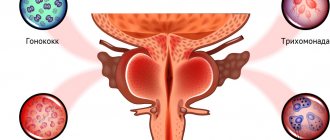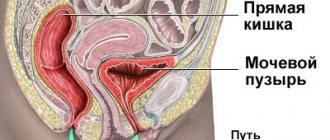More about the condition
Pain when urinating is a common symptom of urological disorders.
An unpleasant sensation may appear immediately during urine output and persist after visiting the toilet. Discomfort can also be caused by the urge to urinate, ejaculation, defecation and other physiological processes. An important sign is the localization of pain: in most cases, irritation affects the distal end of the urethra, but patients often complain of pain radiating to the lower abdomen and perineum. All characteristics of the symptom must be clarified during diagnosis to select the necessary examinations. In the medical literature, urinary dysfunction is called dysuria. This term usually describes fluid retention in the bladder, but pain when passing urine is also a sign of a deurination disorder. This condition can occur during an infectious process, injury, oncology and other diseases. However, not in all cases, dysuria indicates damage to the urethra, since pain can spread to the area of the urethra from other parts of the excretory system.
What does discomfort and pain when urinating indicate?
Discomfort and pain when urinating are one of the most common symptoms of diseases of the genitourinary system in men and women.
For some, the discomfort in the process of emptying the bladder may be very minor, but for others it causes serious concern. Regardless of the severity of urinary disorders, we strongly recommend not to delay contacting a doctor, because any disease is much easier to identify and treat in the early stages of development than in an advanced stage .
Urination is normal
The main function of the excretory system is to cleanse the body and maintain metabolism. The kidneys constantly filter blood that enters the nephrons through the artery. A system of small capillaries and tubules ensures the removal of unnecessary components from the blood and the preservation of useful substances, such as proteins and ions. As a result, secondary urine is formed, transported to other parts of the excretory system for subsequent excretion.
Physiological role of urination:
- Regulation of fluid volume in the body.
- Removing protein breakdown products and harmful metabolites.
- Regulation of the constancy of the chemical composition of the internal environment.
- Maintaining metabolism.
From the kidneys, the resulting urine enters the ureters and accumulates in the bladder. This muscular organ can deposit up to 500 milliliters of fluid, but normally a person feels the urge to urinate when 100-120 ml of urine has accumulated. The final removal of fluid occurs through the urethra: the person independently relaxes the muscular sphincter, and the bladder is emptied. Moreover, the speed and intensity of fluid secretion in men depends on the condition of the prostate gland, through which part of the urethra passes.
Infection and inflammation
Discomfort during deurination may indicate damage to any part of the excretory system. Most often this is a sign of an inflammatory process associated with the penetration of pathogens into the urethra or bladder. The infection can be caused by an invasion of bacteria, viruses, fungi and even protozoa.
Inflammatory etiologies:
- Urethritis is an inflammation of the tissues of the urethra. In most cases, the inflammatory process is a consequence of a bacterial infection.
- Cystitis is inflammation of the bladder. This is a very common urological disease among women, manifested by dysuria, pain in the pubic area and fever.
- Sexually transmitted infections. Dysuria can be caused by chlamydia, gonorrhea, herpes or other sexually transmitted pathology. Without treatment, the infection can spread to the internal genital organs and cause severe complications.
- Pyelonephritis is an inflammatory process in the kidney tissue. The main symptom of this disease is lower back pain, but many patients also complain of painful urination.
- Inflammation of the prostate gland (prostatitis). This pathological condition is often diagnosed in older men.
- Infections of the external and internal genital organs in women. Thus, bacterial vaginitis often manifests itself as discomfort during urination.
The nature of the pain depends on the characteristics of the infectious agent.
Common reasons for men and women.
The main cause of pain when urinating is inflammatory processes in the organs of the urinary system, which are most often caused by infections. When the bladder is damaged, cystitis develops, when the urethra (urethra) is damaged - urethritis, and when the kidneys are damaged - pyelonephritis.
Cystitis.
A characteristic symptom is a constant feeling of fullness of the bladder and a frequent, often false, urge to urinate. Pain and cramps appear at the end of urination. Urine may take on an unusual color or contain blood. Possible pain in the lower abdomen, increased body temperature, fever, weakness, lethargy.
Women suffer from cystitis much more often than men. This situation is explained by the fact that women have a short and wide urethra, which makes it easier for infection to enter the bladder.
Urethritis.
Sharp and cutting pains accompany the entire process of urination. In this case, urine is released intermittently. Mucopurulent discharge with a specific odor and swelling of the genitals are possible.
In men, urethritis develops much more often than in women, since the long and narrow urethra traps pathogens.
Pyelonephritis.
In addition to painful urination, aching pain occurs in the perineum, lower back, temporal and occipital parts of the head. The volume of urine decreases, body temperature rises, the patient feels chills and symptoms of intoxication of the body (headaches, nausea, vomiting, diarrhea). In women, at the end (and sometimes at the beginning) of urination, blood appears in the urine, which is why it turns red, brown or brown.
Mixed infection.
If the infection affects several organs (kidneys, urethra, bladder), then pain accompanies the entire process of urination.
Other factors can also provoke painful urination:
Sexually transmitted infections.
With an STD, the infection can penetrate the urethra, which is why every urination is accompanied by pain and burning. Pathological discharge appears, emitting an unpleasant odor.
The most common infections include candidiasis (thrush), bacterial vaginosis, trichomoniasis, chlamydia, ureaplasmosis, mycoplasmosis, genital herpes, gonorrhea, and syphilis.
With chlamydia, the process of urination becomes more frequent, accompanied by burning pain, itching and burning, fever and general weakness are possible. In women, pain may be detected in the lower abdomen, purulent mucous discharge, in men - traces of blood in the urine and semen, glassy discharge. Often chlamydia in men causes the development of urethritis and sexual dysfunction.
Trichomoniasis disrupts the functioning of the entire genitourinary system, causing pain, itching and burning when urinating. In women, the first manifestation of the disease is discharge with a strong odor and redness of the genitals. In men, blood inclusions in the urine and semen, foamy and purulent discharge become noticeable. Trichomoniasis often causes the development of prostatitis or vesiculitis.
Ureaplasmosis is often asymptomatic. But unpleasant signs may also be observed - nagging pain in the lower abdomen, pain and discomfort when going to the toilet and during intimacy. At the initial stages, the discharge is colorless and odorless; later it turns yellow and acquires a distinct odor.
With mycoplasmosis and ureaplasmosis, pain when emptying the bladder and other unpleasant symptoms appear only in the acute phase of the disease.
Gonorrhea causes disorders, pain (most pronounced in the morning) and burning sensation when urinating. In the acute form, the urethra swells and greenish-yellow (mucopurulent) discharge is observed.
With genital herpes, pain and cramping are felt at the beginning of emptying the bladder. A characteristic rash may appear.
Syphilis is characterized by the formation of a hard chancre at the site of infection. In men, urination becomes painful.
Urolithiasis (urolithiasis).
Stones in the bladder, moving through the urethra, injure the mucous membranes, causing severe pain, stinging and burning. Also characteristic are paroxysmal pain sensations in the lower abdomen, lower back and groin (they intensify with changes in body position, walking, physical activity), a persistent feeling of fullness of the bladder, hematuria (the presence of blood in the urine) may be observed, and vomiting is possible. If stones block the urinary tract, renal colic occurs and urination becomes intermittent or stops altogether.
In severe cases, the temperature rises, chills, dizziness, nausea, and vomiting are observed.
Tumors in the organs of the urinary system.
Benign and malignant neoplasms make it difficult to urinate, causing the process to cause severe pain. Blood may be found in the urine.
Tumors in the intestines.
In some cases, tumors located in the rectum put pressure on the urethra, causing discomfort when urinating.
Gout.
In patients, the urine contains a high concentration of uric acid crystals. Their movement along the urethra is accompanied by pain.
Exacerbation after infectious diseases.
ARVI, influenza, sinusitis, and tonsillitis can cause complications in various organs. Possible problems include difficulty urinating - pain, frequent or difficult emptying of the bladder.
Spondyloarthritis and arthropathy.
These diseases can affect the urinary tract, leading to frequent, painful urination.
Injury to the perineum.
Injury or mechanical stress (rough underwear, cycling, sexual activity) can irritate the urethra, causing pain when emptying the bladder.
Damage to the urethral mucosa by chemicals.
A similar situation occurs if the urine contains a lot of glucose (with diabetes), oxalates (with gout), toxins (with uncontrolled use of medications, alcohol abuse or spicy foods).
Surgical intervention.
An inserted catheter may cause a burning sensation and pain when emptying the bladder.
Allergy.
Some people may experience allergic reactions to stabilizers, dyes, fragrances included in soap, lubricants, and spermicides. The result is itching, irritation and swelling in the genitals, which can make emptying the bladder painful.
Other reasons
Not in all cases, discomfort during urine output is associated with infection. Structural diseases can also cause dysuria.
Additional reasons:
- Urolithiasis is the formation of stones in the urinary tract. Stones not only make it difficult to pass urine, but also damage the mucous membranes, resulting in pain.
- Oncology. The growth of a malignant or benign tumor in the urinary tract can cause severe pain. This can be a relatively harmless disease, such as urethral polyps, or an aggressive variant of oncology with a poor prognosis.
- Abnormal narrowing of the lumen of the urethra (urethral stricture). In the presence of such a disease, urination becomes not only painful, but also very difficult.
- Formation of stones in the kidney tissue (renal stones). Small stones spread with urine into the underlying parts of the excretory system.
It is advisable to conclude that dysuria can occur in a large number of urological disorders, so it is impossible to clarify the cause of the symptom without further examination of the patient.
Risk factors
In addition to certain diseases that affect the process of urine excretion, urologists take into account the significance of various forms of predisposition to dysuria. These may be individual characteristics of a person, diseases of distant organs and other signs.
Possible risk factors:
- Taking certain medications. Thus, the use of chemotherapy often leads to dysuria.
- Gender. Women have a shorter and wider urethra, which increases the risk of genitourinary infections.
- Age. Discomfort in the urethral area is typical for older people.
- Recent diagnostic or therapeutic interventions in the urethral or bladder area. This may involve taking a smear, urography, or another procedure.
- Improper use of personal hygiene products. Penetration of soap into the urethra leads to irritation of the mucous membrane of the organ.
- Allergies to personal care products, synthetic materials and other items.
- Congenital anatomical defects of the excretory system.
Before making a diagnosis, you need to make sure that the pain is not associated with the above factors.
How does discomfort and pain manifest when urinating?
Discomfort and pain when urinating can manifest itself in different ways:
- a feeling of intense burning and itching that can occur both at the beginning of urination and at the end
- pain in the genitals, urethra, or groin area after urinating
- difficulty urinating, in which the stream of urine is very weak, intermittent, or urine comes out in drops. Men may also experience a split urine stream.
If you have one or more of the above symptoms, you may have a serious genitourinary tract disease , which should not be left untreated to avoid serious complications. Very often, discomfort during urination is accompanied by other pathological signs, for example, pain in the perineum or groin, discharge from the genital tract, etc. Based on the existing clinical picture, as well as the examination data, the doctor will make a final diagnosis.
Additional symptoms
Dysuria is rarely the only symptom of the disease. Urological disorders sometimes cause more serious disorders that constantly bother the patient.
Other pathological signs:
- irradiation of pain to the lumbar region, lower abdomen and perineum;
- the appearance of bloody urine (the fluid may be reddish or dark brown);
- unpleasant odor in urine;
- urinary retention: the patient must strain to empty the bladder;
- increased body temperature;
- burning in the area of the external genitalia;
- decreased libido;
- false urge to defecate;
- dizziness, constant weakness;
- nausea and vomiting.
The appearance of fever, severe pain and weakness indicates a serious illness. During pregnancy, an acute genitourinary infection can negatively affect the condition of the fetus, so a woman suffering from dysuria should visit a gynecologist or urologist.
Diagnostics and treatment in our clinic
If you feel discomfort and pain when urinating, this should be a good reason to contact a urologist. In our clinic, to find out the causes of this condition, you may be prescribed the following studies:
- clinical urine test
- bacteriological examination of urine
- smears on flora
- PCR analysis to detect sexually transmitted infections
- Ultrasound of the pelvic organs and ultrasound of the prostate gland for men
- cystoscopy.
Based on the results of the studies, treatment will be prescribed aimed at eliminating the main cause of discomfort. This may be antibiotic therapy prescribed for inflammatory diseases of the genitourinary tract. The choice of specific medications for the treatment of certain pathologies that cause discomfort when emptying the bladder is always made on an individual basis. If you have urolithiasis, you will most likely be prescribed medications to help break up and remove stones. For large stones, their crushing is carried out using ultrasonic equipment.
Diagnostics
Urologists deal with any disorders of the excretory system. During the appointment, the doctor will question the patient in detail about symptoms and study medical history to look for risk factors for diseases. The initial examination sometimes reveals additional symptoms. An accurate diagnosis can be made only after receiving the results of instrumental and laboratory studies.
Diagnostic procedures performed:
- A blood test is the first test that needs to be done for dysuria. Detection of white blood cells in the urine suggests the presence of infection. In addition, the doctor evaluates the chemical composition of the urine.
- Blood test to detect additional pathologies. For example, detection of prostate specific antigen (PSA) in the blood serum of men may indicate prostate disease.
- Ultrasound imaging of the bladder, prostate and internal genital organs in women. Ultrasound is a completely safe non-invasive method of examining the genitourinary system.
- Endoscopic examination of the inner surface of the urethra and bladder.
- Urethral smear followed by cytological and microbiological examination of the material.
- High-precision imaging methods: radiography with contrast, computed tomography. Obtaining volumetric images may be preferable if cancer is suspected.
The doctor may prescribe a limited number of tests after examining the patient and studying the medical history.
Treatment
Pain when urinating is only an individual symptom, so the root cause of the disorder should be treated after a thorough diagnosis. Depending on the identified pathology, the patient may require surgical or therapeutic treatment. Sometimes examinations do not allow us to determine the cause of the unpleasant sensation - in this case, the doctor will advise the patient to use safer hygiene products and give up bad habits.
Possible treatments for the causes of dysuria:
- The use of antibacterial drugs to destroy pathogenic bacteria. In case of chronic infection, it is recommended to test the sensitivity of microflora to certain medications.
- Antifungal and anti-inflammatory agents.
- Symptomatic therapy with painkillers and antispasmodics.
- Surgical and therapeutic interventions aimed at extracting stones, removing tumors and restoring patency of the urinary tract.
Thus, dysuria can be eliminated by treating the underlying cause of the symptom. In addition to the use of medications, patients are advised to give up alcohol, cigarettes, coffee and too spicy foods.
How and with what to treat urethritis in women
Which doctor treats urethritis in women? Considering the potential danger of the disease for women’s health, timely and comprehensive assistance from a good specialist is necessary. Moreover, possible complications are associated not with urethritis itself, but with the reasons that caused it. In our clinic, a girl with symptoms of urethritis can make an appointment with a gynecologist - our doctors are well versed in the features of diagnosis and effective treatment of this disease!
When prescribing a treatment regimen for urethral inflammation, the gynecologist usually solves three main problems:
- Restoring the properties of the wall of the urethra.
- Correction of normal vaginal microflora. As long as there is a constant infection of the urethral wall with microorganisms from the vagina, the disease will return again.
- Boosting the immune system. In the presence of vaginal dysbiosis, the immunity of the body in general and the bladder wall in particular suffers. If it is not restored, treatment of urethritis in a woman will not have a lasting effect.
Doctors consider antibacterial drugs of one or a combination of two names to be the most effective and common method of treating urethritis. Antibiotics are not used in the regimen only if the disease has a viral or fungal cause. Physiotherapy and other additional treatment methods in gynecology are indicated, especially if a woman’s urethritis is complicated by cystitis.
It is recommended to follow some nutritional rules: you need to drink one and a half liters of clean water per day, you cannot take alcohol, spicy, spicy and highly salty foods. And if inflammation of the urethra occurs after intimacy, find out about a possible solution to this problem by injecting a filler gel.
How is chronic urethritis treated?
Unlike the acute form, therapy for chronic urethritis in women should be long-term and multifaceted. Usually in such cases doctors prescribe:
- Antibiotics depending on the type of infection;
- Instillation (washing the urethra) with antiseptics;
- General strengthening therapy, vitamins;
- Physiotherapeutic procedures, urethral massage.
And even after a full comprehensive course of therapy, the risk of relapse cannot be excluded. It is very important that the patient follows all the specialist’s recommendations and regularly takes preventive courses according to the schedule! Therefore, if you have been diagnosed with urethritis, a treatment regimen can be obtained from the gynecologists of our women's clinic by making an appointment by phone ☏ +7(495)790-0779











